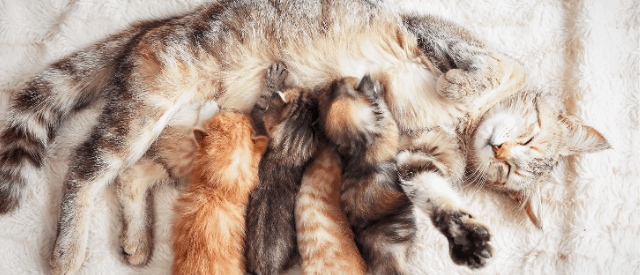When your queen cat has kittens, it can be a scary yet exciting time. It is important to know what to expect so that you can set up the best environment for the new family, and be prepared to step in, if needed, to help your new mother cat and her babies thrive.
In this article we’ll look at some common behaviors you should expect in queens and their kittens, plus tips to help them get off on the right foot. If there’s anything out of the ordinary, this guide will help you assist your new momma cat to give the best start in life to her babies. Although your momma cat has every intention of being a great mom, some kitties just have better developed mothering instincts than others. 🙂

Source: Giphy
The kittening box needs to stay in a calm area
If your cat had her kittens in your home, you probably already set up a kittening box for her. This is an ideal place for a new mom and her babies to stay safe. The box should be kept in a calm, quiet area of the house so that the queen is less anxious. The area should also be warm and away from cold drafts. Bright lights may be too stressful and hot, so consider lowering the lights if this is the case.
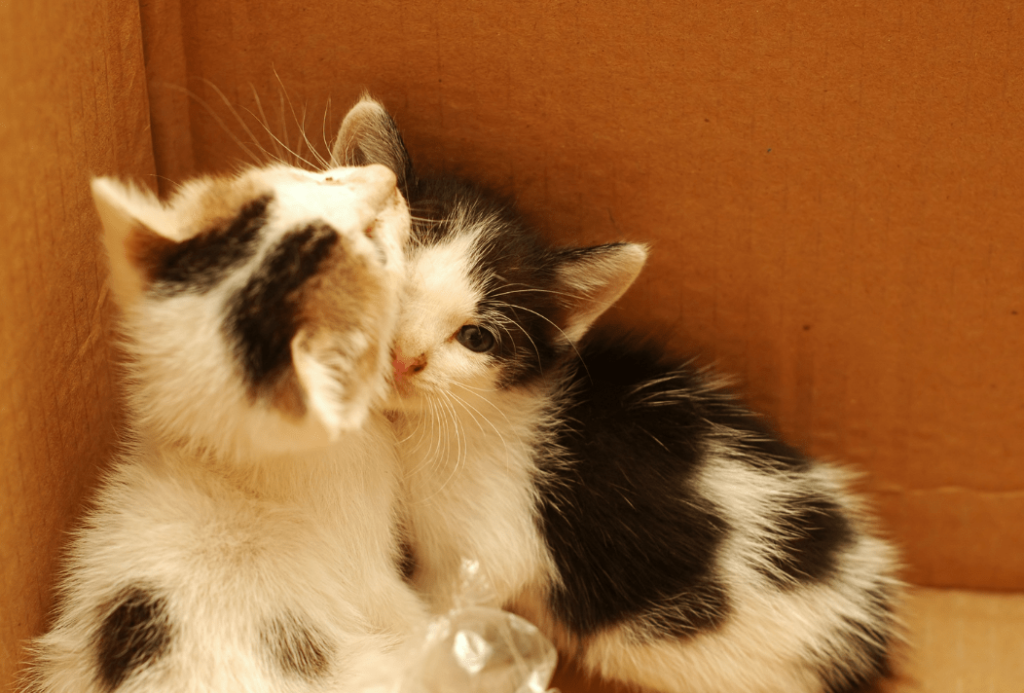
Kittens should start nursing in the first one to three hours of birth
It is important for newborn kittens to start nursing within the first one to three hours of having been born. This is because colostrum is provided within those first few hours. Colostrum is a nutrient-dense form of milk that contains the mother’s antibodies, and these antibodies are given directly to the kittens when they initially nurse. This means that kittens will develop the same immunities as their mom and will carry the immunities for the first eight weeks of their life. This is also why it is important for queens to receive routine vaccinations.
The mother cat generally cleans her kittens right away
When the kittens are cleaned by their mother, this helps them to dry off faster, which is important for keeping themselves warm. By snuggling next to their mom, the kittens can stay warm. If the queen keeps getting up and out of the box, or if she doesn’t clean them, you may need to step in to help dry them and provide a heat source. Do not directly place a heat source underneath the kittens!
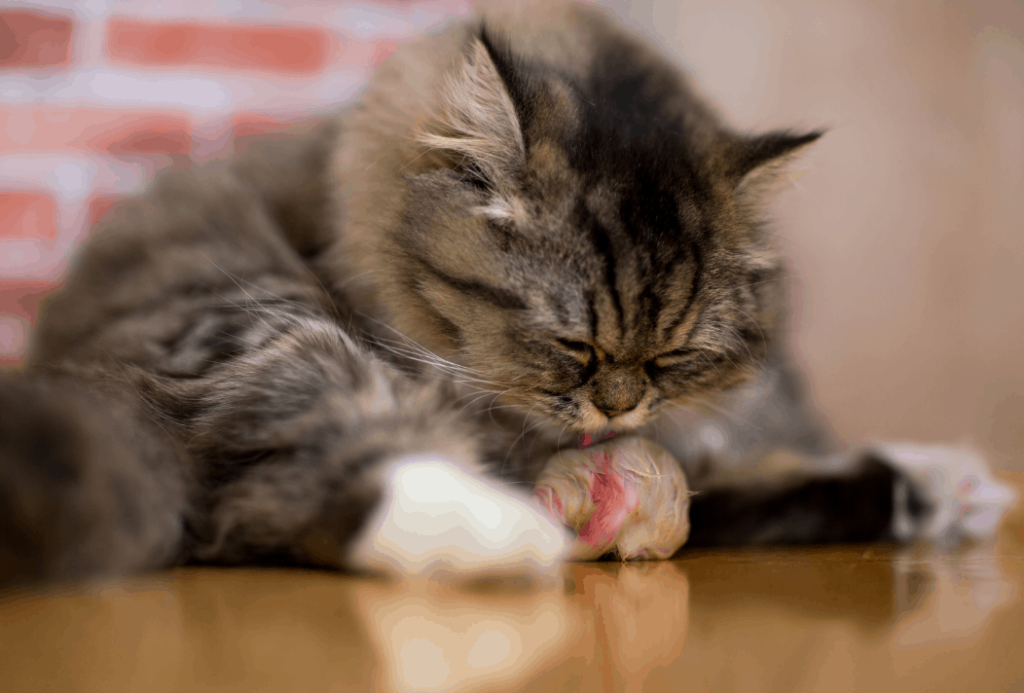
Kitten’s are born with their eyes closed, but if they don’t open by day 15 you’ll need to get to the vet
A kittens’ eyes will be completely closed until they are about eight to fourteen days old. Infection can sometimes occur, and this may cause swelling behind the eyelids. Sometimes, pus is also visible. If one of the kittens has this kind of swelling or the eyes do not open by day 15, you will need to schedule an appointment with your veterinarian.
Kitten milestones in the first 4 weeks
Newborn kittens should be nursed until they are full and then usually fall asleep afterward. Their mother will help them to go to the bathroom, and they should be able to urinate and defecate at least once a day.
First 2 weeks: Newborn kittens should be sleeping or eating about 90% of the time, for the first two weeks of their life.
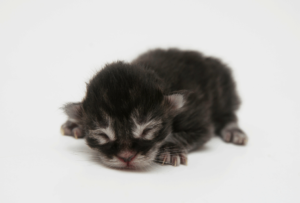
After 2 weeks: Their eyes open, they should be able to stand on their own.
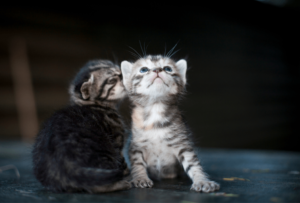
Three weeks: They can start to climb.
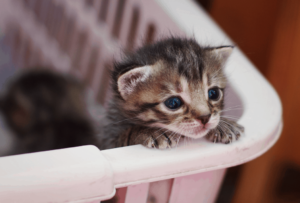
Four weeks: They can walk, run, and play.
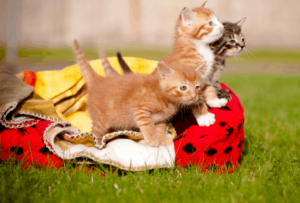
Keep a close eye on those kittens while they grow
Kittens can easily run into life threatening health concerns in the first few weeks of their life. For this reason, it’s important to monitor their progress and any conditions they may develop very closely. Here are a few things to look out for.
A kitten who cries after of during nursing
Sometimes, crying during and after nursing can indicate that there is a problem. If a kitten has an infection or parasite infestation, it may cause gastrointestinal upset. If the mother has a mammary gland infection called mastitis, it can negatively impact milk quality.
A kitten who isn’t gaining weight
Another sign of milk problems or nutritional problems is when kittens are not gaining sufficient weight. Kittens should double in weight by the first week. If this is not the case, and the kittens are otherwise healthy, you may need to use milk replacer.
A kitten who needs a milk replacement
For kittens that need milk replacer but are still receiving their mother’s milk, you can follow the instructions on the container for mixing, but feed about half of what is recommended. You should warm the mixed replacer to a temperature of about 95 to 100 degrees Fahrenheit. You can supplement the milk twice to six times per day. Use a small bottle that only provides very slow drops to avoid overfeeding or aspirating milk replacer.
A kitten with diarrhea or intestinal parasites
Kittens can start using the litter box at about three weeks of age. Carefully monitor their stool output and look for signs of diarrhea or intestinal parasites. If you are seeing any of these problems, your veterinarian can check the stool and prescribe treatment. Kittens as early as two weeks of age can be given a dewormer, but remember to check with your vet before using any over the counter dewormers. Bloody stools and round, firm bellies can also indicate health problems.
When should the kittens start eating?
Kittens can start solid foods around three to four weeks of age. To start, you can make a gruel with a milk replacer and a small amount of kitten food.
After four weeks, the kittens should be on regular kitten food and no milk supplements. Both canned and dry foods are acceptable. The kibble should be very small, and the canned food will be very fine. Sometimes, your kittens will need to have their faces cleaned because they can be messy eaters!
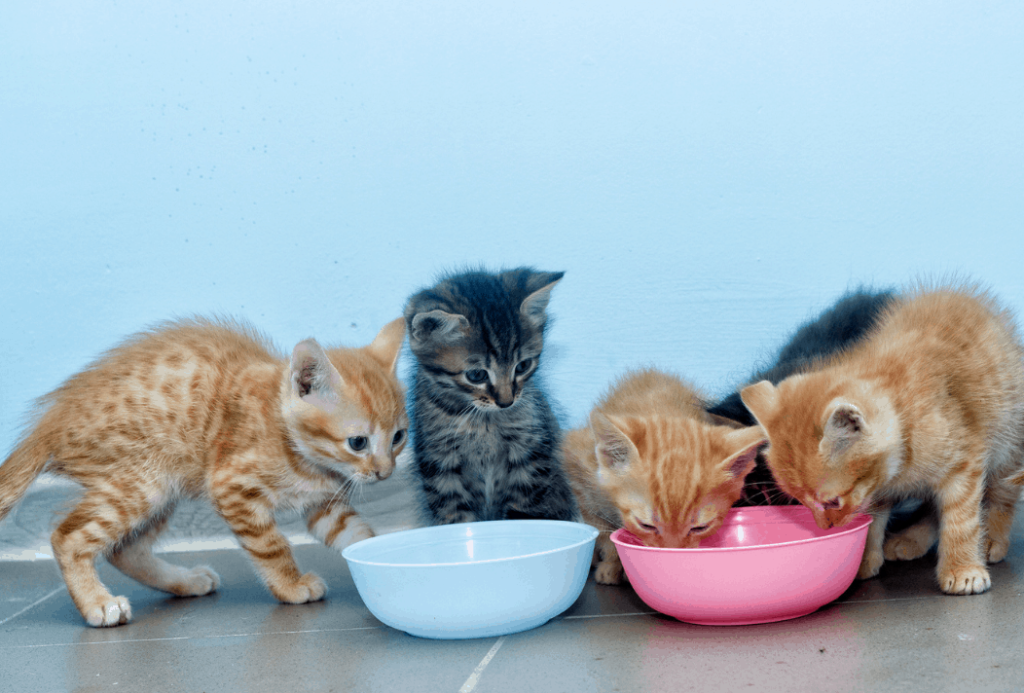
Your queen may also need assistance and monitoring, especially if she had a large litter
If your queen has a large litter, those kittens should receive a milk replacer to help her cope. All queens should be eating food made for kittens because of the higher calorie count.
When the kittens are roughly three to five weeks old, their mother will be at a higher risk for developing eclampsia, which is when the calcium content in her bloodstream becomes severely decreased. This can cause muscle tremors and seizures, so it is important to monitor for these signs as the kittens are about to be weaned.
Remember: It’s important to be there for your queen and her kittens, they may need your help!
There can be lots to consider when your cat has kittens. Knowing what to expect ahead of time can save you a lot of trouble and frustration! Remember to keep your vet’s phone number handy if you have any questions and remain on standby in case your queen and her kittens need your assistance.
Not only can you provide early intervention for various problems, you can also help socialize the kittens with frequent handling and care.



